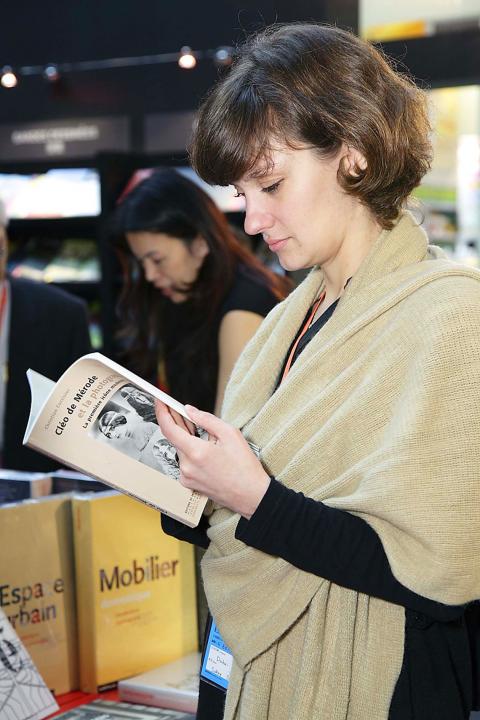The 19th annual Taipei International Book Exhibition (台北國際書展) may unlock the secret to satisfaction. The theme country for the event, which opened on Wednesday and runs through Monday at the Taipei World Trade Center (台北世界貿易中心), is the country that introduced the Gross National Happiness index in 1972.
Guests from Bhutan include Karma Ura, the director of the Center for Bhutan Studies, who will discuss the Gross National Happiness index as one of the opening speakers today at 9am on the second floor of Exhibition Hall 1.
Book lovers will certainly be filled with glee: The exhibition features 20 sections, 700 activities and 300 participating authors.

Photo Courtesy of the Taipei International Book Exhibition
Bhutan’s participation in this year’s exhibition is meant to increase exposure for Bhutanese writers and draw attention to efforts to improve the country’s literacy rate (which was 56 percent in the five-year period from 2003 to 2008, according to UNICEF).
“This year’s event is a rare opportunity to get to know a country that is very mysterious for a lot of people,” said exhibition coordinator Michelle Tu (涂文貞). More than 300 books by Bhutanese authors on topics ranging from history and architecture to traditional clothing — many of which have been translated into English or Chinese — are available to browse. Kunzang Choden, said to be the first Bhutanese woman to write a novel in English, speaks at 4pm this afternoon at the Bhutan Pavilion in Exhibition Hall 1.
Literary and religious artifacts from Bhutan’s national collection will be displayed, including a 12th century copy of the Buddhist text The Eight Thousand Verses of Transcendental Wisdom (八千誦); an original copy of the biography of Padmasambhava, who introduced Vajrayana Buddhism to the country; and a decree issued by Shabdrung Ngawang Namgyal, who united the tribes of Bhutan into a nation state in the 17th century.
“Some of these items have never left Bhutan before. They are truly national treasures,” said Tu. Events through Sunday at the Bhutan Pavilion include exhibitions about the country’s traditional clothing and music, and afternoon teatime with suja (or butter tea) and handmade pastries.
The exhibition’s roster of participating authors includes literary luminaries like Jostein Gaarder, the author of international best seller Sophie’s World, who will speak at 3:30pm, and Dan Millman, author of The Journey of Socrates, who speaks at 4:45pm. Both events will be held at the Red Salon (紅沙龍) in Exhibition Hall 1.
Taiwan’s own pavilion features two exhibitions. One, by the National Museum of Taiwan Literature (國立臺灣文學館), displays 100 manuscripts and handwriting samples from renowned writers and scholars. The other traces this country’s development through maps from the 1930s to the 1970s collected by historian Chuang Yung-ming (莊永明).
Fourteen other countries have their own sections, including France, Germany, the US, Poland, Israel, South Korea, Japan and Thailand.
As at previous book exhibitions, manga and animation lovers can participate in illustration classes, puppet shows and cosplay competitions at the Comics Hall. Children can listen to storytellers or go shopping at a stationery pavilion with more than 60 exhibition booths featuring the latest in school and art supplies.
One section dedicated to electronic readers is balanced by an art exhibit titled The Impossible Library (不可能的圖書館), which focuses on the art of bookmaking through displaying books by 22 artists, including Italians Bruno Munari and Lucio Fontana, that were influenced by surrealist, dadaist and conceptual art.

That US assistance was a model for Taiwan’s spectacular development success was early recognized by policymakers and analysts. In a report to the US Congress for the fiscal year 1962, former President John F. Kennedy noted Taiwan’s “rapid economic growth,” was “producing a substantial net gain in living.” Kennedy had a stake in Taiwan’s achievements and the US’ official development assistance (ODA) in general: In September 1961, his entreaty to make the 1960s a “decade of development,” and an accompanying proposal for dedicated legislation to this end, had been formalized by congressional passage of the Foreign Assistance Act. Two

March 31 to April 6 On May 13, 1950, National Taiwan University Hospital otolaryngologist Su You-peng (蘇友鵬) was summoned to the director’s office. He thought someone had complained about him practicing the violin at night, but when he entered the room, he knew something was terribly wrong. He saw several burly men who appeared to be government secret agents, and three other resident doctors: internist Hsu Chiang (許強), dermatologist Hu Pao-chen (胡寶珍) and ophthalmologist Hu Hsin-lin (胡鑫麟). They were handcuffed, herded onto two jeeps and taken to the Secrecy Bureau (保密局) for questioning. Su was still in his doctor’s robes at

Last week the Democratic Progressive Party (DPP) said that the budget cuts voted for by the China-aligned parties in the legislature, are intended to force the DPP to hike electricity rates. The public would then blame it for the rate hike. It’s fairly clear that the first part of that is correct. Slashing the budget of state-run Taiwan Power Co (Taipower, 台電) is a move intended to cause discontent with the DPP when electricity rates go up. Taipower’s debt, NT$422.9 billion (US$12.78 billion), is one of the numerous permanent crises created by the nation’s construction-industrial state and the developmentalist mentality it

Experts say that the devastating earthquake in Myanmar on Friday was likely the strongest to hit the country in decades, with disaster modeling suggesting thousands could be dead. Automatic assessments from the US Geological Survey (USGS) said the shallow 7.7-magnitude quake northwest of the central Myanmar city of Sagaing triggered a red alert for shaking-related fatalities and economic losses. “High casualties and extensive damage are probable and the disaster is likely widespread,” it said, locating the epicentre near the central Myanmar city of Mandalay, home to more than a million people. Myanmar’s ruling junta said on Saturday morning that the number killed had